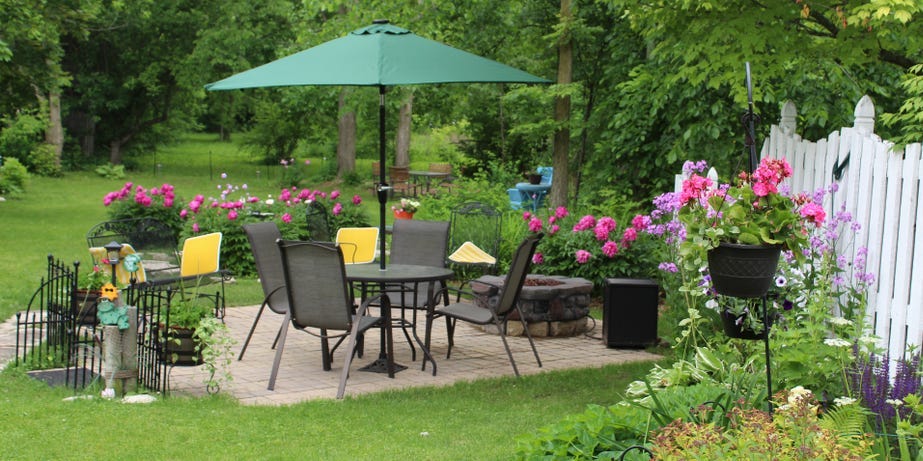Ignoring your local climate when purchasing furniture.
I often see people choose furniture that doesn’t suit their local climate. For instance, metal furniture can rust in the coastal salty air, and using untreated wood in sunny, arid climates can cause furniture to dry out, crack, and warp.
These mistakes look unsightly and weaken the furniture. Instead, I suggest choosing weather-resistant options designed for your environment.
For example, high-density polyethylene furniture (structures made from mainly recycled materials resistant to rusting and cracking) holds up well in regions with harsh weather.
Relying on flood lights to illuminate the backyard.
Proper lighting is essential for efficiency and ambiance. Though floodlights may be needed for utility purposes, they’re too bright to create a relaxing environment.
Instead, I recommend using a mix of ambient lighting (lighting that provides the most illumination for a space), like string lights, sconces, or lanterns.
Install task lighting — bright directional light meant to illuminate a work area — for activities like grilling. Finally, accent lights — lighting intended to highlight certain features — can elevate water fountains or garden paths.
Using dark colors in hot climates.
Dark-colored furniture and flooring absorb heat, making them uncomfortable in sunny climates. For example, a dark metal bench will be scorching hot under the midday sun.
Asphalt ground coverings or dark stone pavers will radiate more heat than lighter tones and materials. I recommend opting for beige concrete and light wood tones, which will better reflect sunlight and stay cool to the touch.
Ignoring the scale of your patio.
Selecting furniture that doesn’t match the scale of your outdoor space can disrupt visual harmony — the balanced arrangement of furniture and decor.
For instance, a massive sectional on a small patio can make the area feel cramped. Alternatively, a small set of chairs on a large deck will seem unfinished.
To make the backyard an intentional extension of your home, incorporate the same design rules you’d use indoors. For example, ensure you have 3 feet of clearance around large furniture, avoid placing seats further than 10 feet apart, and allow for about 1-½ feet between a couch and coffee table.
Overlooking privacy solutions.
Open decks with no privacy measures make me feel like I’m on display for my neighbors. To create a more secluded space, I like to layer various solutions, such as evergreen trees, privacy hedges, and fences.
If you have a large yard, consider installing a pergola with climbing plants or a closed wall facing the neighbors. These elements not only enhance privacy but also add to the visual appeal of a backyard.
Installing water features without understanding the required maintenance.
Water features like fountains or ponds can add a tranquil vibe to a backyard. Still, they need regular upkeep to avoid issues like algae growth or mosquito breeding.
Fountains and ponds can clog and stop working over time, and standing water, such as birdbaths, needs to be emptied regularly.
I recommend clients who love water features establish a maintenance routine that includes regular cleaning, using water treatments (such as sludge reducers), and checking pumps and filters.
Skipping on shade options.
Without planning for adequate shade, your backyard can become unbearable on hot days. Structures like retractable awnings, umbrellas, and pergolas with UV-resistant fabric covers are great ways to add shade to a backyard.
If your yard has tall trees, I recommend planning the layout to account for the sun’s direction in the summer months so that you can use the trees’ natural shade.
Read the full article here


